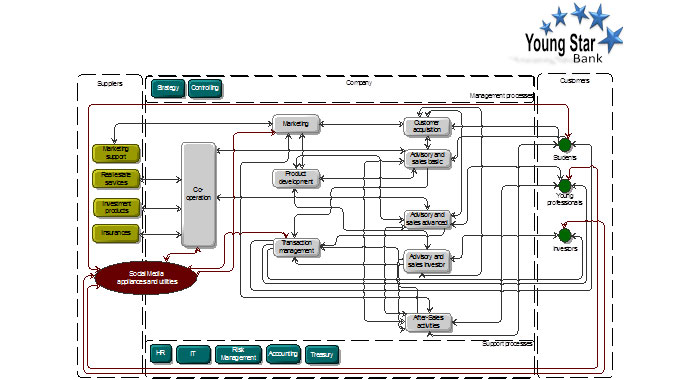Choose your language
ProcessLab of Frankfurt School of Finance & Management
About us
The ProcessLab
is a research center of the Frankfurt School of Finance & Management. The center deals with various aspects of process management, primarily in the financial services sector.
Our vision
We are the first point of contact in Germany for the development of innovative, academic solutions for process management in the financial sector.
How do we achieve this?
We work closely together with practitioners and link up internationally with researchers. Several event series of the ProcessLab facilitate the exchange between academics and practitioners in the field of process management.
Our strengths
- Identification and development of new research topics in process management
- Development of scientifically substantiated concepts and methods
- Independent platform for the exchange of ideas between science and practice
- Contacts to key actors in process management
- Involving students in current research projects
Our current research areas focus on
- Studies on Lean Six Sigma / OPEX
- Success factors and barriers in the use of blockchain technology
- Digitalization by means of Digital Innovation Labs
- Customer centricity in banks and insurance companies
- Process standardization and process governance
- Decentralized platform-based business models

Presently, the ProcessLab team consists of two co-heads, Prof. Dr. Moormann and Prof. Dr. Beimborn, two PostDocs, three PhD students, and two student assistants. Nine former staff members of the ProcessLab have received their doctorates to date.
Co-Heads

Prof. Dr. Jürgen Moormann

Prof. Dr. Daniel Beimborn
Professor for Information Systems Management at the University of Bamberg
Associate Members

Dr. Nadine Ostern, Cisco Chair in Trusted Retail
PhD Students
Associated Members
Former PhD students
Dr. Andreas Burger
Partner, Forensic and Financial Crime Advisor - Deloitte GmbH Wirtschaftsprüfungsgesellschaft
Dr. René Börner
Digitalisierungsmanager – dwpbank AG
Dr. Corinna Grau
Leiterin Schadenprozesse und -entwicklung - Württembergische Versicherung AG
Dr. Diana Heckl
Leiterin Vertragsmanagement - Volkswagen Financial Services AG
Dr. Matthias Hilgert
Chief Transformation Officer - Basler Versicherungen Deutschland
Dr. Ann-Kathrin Palladino-Hirzel
Senior Program Manager – Neology (USA)
Prof. Dr. Michael Leyer
Professor für ABWL: Digitalisierung und Prozessmanagement – Philipps-Universität Marburg
sowie Adjunct Professor - QUT Brisbane (Australien)
Dr. Elisabeth Palvölgyi
Customer Journey Expert, Tribe ‚Digital Leadership‘ – ING Deutschland
Dr. Francesco Pisani
Director, M&A Transaction Services - Deloitte GmbH Wirtschaftsprüfungsgesellschaft
Dr. Anne Schaefer
Studentin der Klassischen Archäologie – Goethe-Universität Frankfurt
Research fields
The ProcessLab is essentially supported by the research work of our PhD students at the Frankfurt School of Finance & Management. Our PhD students are supervised by a professor and by an external partner.
The supervising professor is primarily responsible for the scientific rigor, relevance, and methods, whereas the external partner, usually one of our sponsors, is responsible for ensuring practical relevance.
Dissertations at Frankfurt School are always supervised by two of our professors as well as by one professor from another university.
International study about Lean Six Sigma
Lean Six Sigma (LSS) is the combination of Lean Management and the Six Sigma methodology. Today, LSS is one of the most important concepts for increasing operational efficiency. Accordingly, the concept is being used in many companies in the financial sector today. In order to determine the current status as well as approaches for the further development of LSS, we conducted an international study in cooperation with colleagues from Heriot-Watt University in Edinburgh, the Indian University IIM Tiruchirappalli and the University of Amsterdam.
Employees from banks, insurance companies and other financial service providers participated in the study. One particular aspect was the analysis of the relationship between the project results achieved with LSS (performance) and the companies' capabilities required for successful LSS. Ultimately, we want to develop a theory on how companies can build an (organizational) capacity to successfully apply LSS. Another goal is to develop a concept for measuring this capability.
Process Innovation Capability (PIC)
Particularly against the background of digitalization, the question arises for companies how they can achieve process innovations. What skills are needed to change processes - both incremental improvement and complete redesign? Can these skills be measured? How can these skills be improved in companies?
To answer these questions, we use the Capability-based View. In the first step, we develop a multidimensional concept that considers not only the already trained routines for process change but also the suitability of the organizational structure, the motivation for process innovation and the organizational willingness to implement the developed innovations. In the second step, a tool for PIC measurement will be developed to provide recommendations for setting up PIC capabilities for financial service providers.
Contact: Dr. Yevgen Bogodistov
Process Standardization and Process Governance
The basis for efficient business operations and high service quality are standardized process flows. Successful process standardization must first identify the best possible process, then implement it throughout the entire company and then ensure that standardized processes remain standardized without unwanted local adjustments. Accordingly, not only process models for process standardization are necessary, but also suitable governance to establish and ensure operational excellence. At the same time, mechanisms must be implemented that lead to the necessary acceptance of centrally defined process standards at the employee level.
In our research, we examine success factors and test such procedural and governance models together with companies. We accompany standardization measures in order, among other things, to identify the obstacles to process acceptance and to be able to take them into account in process change projects. With various scientific approaches, such as Action Design Research (implementation of new approaches in companies and subsequent empirical evaluation), case studies and employee surveys, we help companies to evaluate and promote the degree of process orientation and acceptance of process standards in management and the workforce.
Contact: Prof. Dr. Daniel Beimborn
The Impact of Blockchain on the Financial Services Sector
Blockchain was initially launched as an approach to payment transactions based on cryptography to provide an alternative mechanism for trust between two transacting parties. The number of use cases has increased ever since and the emergence of blockchain has led to an animated discussion among both researchers and practitioners about its future prospects. In our research, we focus on the impacts of blockchain on business models and we analyze the challenges the technology needs to overcome before achieving a breakthrough. Accordingly, our focus lies on organizational acceptance and management aspects in the implementation and application of blockchain solutions.
Contact: Dr. Nadine Ostern
Digitalization through Digital Innovation Labs
Finding and implementing digital innovations is a major challenge for companies, as historically evolved organizational structures often make it difficult for companies to develop and implement innovative processes. Through Digital Innovation Labs, companies are testing new organisational approaches of exploration (innovation finding), internal and cross-company knowledge exchange and the prototype implementation of new, digital business models and services. In these units, people with an IT background, for example, work closely together with employees from specialist departments - often in agile, largely autonomous teams and using personnel rotation models.
In probably the largest German case study series on Digital Innovation Labs, we examine the setup of these labs across all industries, i.e. their mechanisms for innovation identification and implementation as well as for the necessary competence building and knowledge exchange. We examine success factors of such agile units and analyze how the feedback into the existing classical organizational structure takes place.
Contact: Prof. Dr. Daniel Beimborn, Prof. Dr. Jürgen Moormann
Cashless Payments in the Age of Mobility and Ubiquity
Digitization permeates almost all areas of life. This has eminently made the topic of payment procedures enormously important. The trend is clearly moving towards cashless, mobile procedures - be it by card, online, smartphone or combinations of these. The market is considered attractive by many players - from FinTech to the major Internet companies. These companies are trying to compete with traditional banks in this part of the value chain to maintain customer contact or even to create new structures in the payment sector with their own currency, as the example of Libra shows.
Our research focuses on innovations with regard to the business model and the associated processes. These include studies on the use of blockchain in payment transaction processes, on payment concepts in the connected car (in the context of the Internet of Things) and on the influences of emotional states of process designers on the target process in the payment area.
Contact: Prof. Dr. Jürgen Moormann
The role of organizational reconfiguration as well as information systems to increase digital innovation capability
How can companies effectively support their innovation processes through organizational changes and information systems? To answer this question, we investigate how companies need to adapt or even reinvent their organizational structures and innovation management processes in order to achieve a sufficient level of agility, involving all relevant areas of the company (business units, IT, Marketing & Sales, Analytics, Legal, HR) and thus develop innovations faster and more successfully. In doing so, we rely on preliminary work on "Digital Business Strategy" and "Organizational Recombination" to investigate the role of new organisational structures both theoretically and empirically and to identify suitable types of IT support.
Based on the theoretical concepts of Ambidexterity, Organizational Learning, Absorptive Capacity and Organizational Control, we develop an understanding of how organizational reconfiguration and recombination of IT and non-IT units contributes to innovation success. Research questions in this project are: Which restructuring measures are successful to achieve higher agility and higher innovation success? Are Squad and Tribe as well as other Scaled Agile concepts effective or rather separate Digital Innovation Labs? How complementary or substitutive are such approaches? How can IT systems be used to support both internal processes and collaborations with startups and other external partners?
Contact: Prof. Dr. Daniel Beimborn
Decentralized platform-based business models
With the advent of the Internet, platform-based business models such as eBay, Airbnb and Paypal have revolutionized entire industries. While both traditional companies and politicians are concerned with the question of how to counter these business models and how to regulate them, these business models are constantly evolving. A relatively new development is decentralized, blockchain-based platforms. Such platforms (e.g. OpenBazaar) make it possible to sell goods and services via peer-to-peer networks and thus to eliminate intermediaries.
Although this form of platform-based business model is still at an early stage of development, it may have a decisive impact on future business models. Therefore, we will conduct explorative studies to analyze the potential and acceptance of such platforms. To this end, both users and developers of decentralized platforms will be interviewed. In addition, we will develop market entry strategies as well as a taxonomy of (de)central platforms, which will identify the key competitive components of the respective business models.
Contact: Guido Perscheid
Publications
ProcessLab-Conferences
Einmal pro Jahr hat das ProcessLab eine ganztägige Konferenz zum Prozessmanagement in der Finanzbranche veranstaltet. Die ProcessLab-Konferenz fand 15 Jahre lang ohne Unterbrechung statt (letztmalig im Juli 2021). Organisiert wurde sie vom Frankfurt School Verlag. Die ProcessLab-Konferenz war im deutschsprachigen Bereich die größte Konferenz zum Prozessmanagement in der Finanzbranche.
Previous conferences
15. ProcessLab-Konferenz: Plattformorientierung in der Finanzbranche – Konsequenzen für das Prozessmanagement (7.07.2021)
14. ProcessLab-Konferenz: Prozessgestaltung der Zukunft: effizient, digital, kundenzentriert (25.06.2020)
13. ProcessLab-Konferenz: Prozessautomatisierung: Von smarten Prozessen zu smarten Unternehmen (06.06.2019)
12. ProcessLab-Konferenz: Von digitalen zu smarten Prozessen: Analytics, Robotics und Artificial Intelligence (14.06.2018)
11. ProcessLab-Konferenz: AufBruch zur agilen Organisation (01.06.2017)
10. ProcessLab-Konferenz: Die Zukunft der Prozesse - lean, innovativ, digital (09.06.2016)
9. ProcessLab-Konferenz: Prozessinnovation durch Digitalisierung (11.06.2015)
8. ProcessLab-Konferenz: Operational Excellence systematisch und nachhaltig gestalten! (12.06.2014)
7. ProcessLab-Konferenz: Erfolgreiche Prozessverbesserung durch Mitarbeiterintegration (13.06.2013)
6. ProcessLab-Konferenz: Produktion im Back-Office - Neue Ideen in der Finanzbranche (14.06.2012)
5. ProcessLab-Konferenz: Prozessgestaltung am Front-End: Integration in den Kundenprozess (16.06.2011)
4. ProcessLab-Konferenz: Kapazitätsmanagement in Banken – Just in time for a next step (17.06.2010)
3. ProcessLab-Konferenz: Six Sigma in der Finanzbranche: Hype oder Chance? (18.06.2009)
2. ProcessLab-Konferenz: Prozessmanagement in Wertschöpfungsnetzwerken von Banken (18.06.2008)
1. ProcessLab-Konferenz: Messung und Steuerung von Prozessen (14.6.2007)
ProcessLab-Colloquium
In several evening events during the year, researchers and practitioners are brought together for presenting and discussing individual topics of business process management in the financial services area.
For more information, switch to the German version of this page.
ProcessLab-Round Table
Für den intensiven Austausch über ausgewählte Themen des Prozessmanagements in der Finanzbranche haben wir den ProcessLab-Round Table angeboten. Es wurden vier Roun Tables durchgeführt. Hinzu kamen 14 ProcessLab-Workshops für Six Sigma.
This event offers the possibility for an intense discussion on certain important issues of process management in the financial services sector. The meetings are limited to small groups and are conducted one to two times a year.
For more information, switch to the German version of this page.
Six-Sigma KreditSim
In lectures and training seminars on Six Sigma or on business process management, practical examples or lectures from manufacturing are generally used. These examples often appear to be rather abstract for practitioners in the financial service industry, who often experience difficulties in transferring the learnt methods to their businesses.
More Less
In order to sensitize employees within the financial sectors to problems and solutions on a process level, the simulation KreditSim was developed. This business game deals with the loan approval process – the central task in the classic banking business. The participants of the simulation adopt the roles of service specialists processing credit applications at the fictitious bank “Home Loan Bank Ltd.” They perform the respective tasks on the basis of predetermined job descriptions. It becomes quickly apparent in the first round of the simulation that each fictitious employee focuses only on a small part of the whole process chain and that a selective optimization of single parts of the process is not sufficient. The elimination of processing errors and the reduction in total processing time can only be achieved by optimizing the whole process chain.
After the first round of the simulation, the process is analyzed by applying the DMAIC cycle (Define, Measure, Analyze, Improve, Control) and the Six Sigma methodology. Alternatively, other methods of business process optimization can be used in order to identify problems and errors in the process flow. Ideally, participants develop an optimized process flow, which they subsequently simulate. The resulting comparison of both simulations in terms of total processing time and the amount of processing errors serves to demonstrate the importance of Business Process Management.
The simulation KreditSim can be used for different types of trainings, either in the context of Six Sigma or Business Process Management.
Which Process Is Analyzed in KreditSim?
In KreditSim, the loan approval process of the fictitious Home Loan Bank Ltd. is analyzed. Home Loan Bank Ltd. is a leading regional bank specialized in real estate financing. The bank operates four branch offices, where customers are advised by staff members who have been specifically trained in sales of real estate loans and financing. The ultimate decisions concerning the approval of loans and financing packages are, however, made by headquarters rather than the branch offices. The centralization of a standardized rating procedure is intended to ensure timely and qualitatively excellent processing of loan applications. The staff members of a branch office attach particular importance to timely and qualitatively excellent processing of their loan request to headquarters. Staff members are supposed to adhere to the requirements for a loan approval process, which include the following quality criteria:
- Processing the loan decision within 4 days (in the simulation 4 minutes)
- Correct determination of the rating of a loan request, and
- Considering the customer’s wishes while processing the loan (e.g., interest and pay back modalities).
However, the predetermined process design does not allow participants to comply with these criteria. Participants will observe that the requirements cannot be met at present. A decision concerning the approval takes 9 to 10 days (i.e., 9 to 10 minutes in the simulation). Furthermore, incorrectly determined ratings and thus incorrect loan decisions occur permanently. In addition, customers’ wishes are insufficiently considered. An in-depth analysis of the loan approval process is consequently essential.
KreditSim is well-suited to illustrating the Six Sigma methodology in a seminar. Participants learn how to define the process based on customer requirements, to enhance the loan process on the basis of different quantitative and qualitative criteria, and to conduct process analyses. Participants are shown that the problems are caused by unspecified interfaces, non-value adding processes, and the process flow. Participants are then challenged to find new solutions for a loan process design without reducing staff or automating the process.
How Does KreditSim Work?
KreditSim can be divided into 3 phases: The first phase relates to the simulation of the current loan process of the Home Loan Bank Ltd. (as-is-situation). This phase is standardized and constant, as the used materials and simulation instructions are predefined. The second phase addresses the optimization of the process. During this phase, participants receive guidance from a trainer. The DMAIC cycle of the Six Sigma methodology can be applied to design a new loan approval process (target situation). In the third phase, participants simulate the optimized loan approval process. The success of the process optimization can be documented and be compared to the results of the initial situation.
The simulation is limited to 18 participants and a moderator. If the number of attendants exceeds this number, any additional seminar members can be deployed as observers during the simulation and they can participate subsequently in the optimization phase. The number of participants can be reduced to 12 participants without negatively impacting the basic flow.
KreditSim is a protected trade mark (Nr.: 302009 048 678).
For more information on KreditSim please send an e-mail to Prof. Dr. Jürgen Moormann.
Publications on KreditSim
Leyer, M./Hirzel, A.-K./Moormann, J. (2015): Effectiveness of role plays on process-oriented behavior in daily work practices: An analysis in the financial services sector, in: Proceedings of the 23nd European Conference on Information Systems (ECIS 2015), Münster, Paper 120.
René Börner, Jürgen Moormann, Minhong Wang (2012): Staff training for business process improvement: the benefit of role-plays in the case of KreditSim, in: Journal of Workplace Learning, 24. Jg. (2012), Nr. 3, S. 200-225 (DOI: 10.1108/13665621211209276)
Moormann, J./Börner, R./Wang, M. (2011): Advancing staff training: Transforming a paper-based role play into a workflow management system, in: Development and Learning in Organizations, 25. Jg., Nr. 6, S. 16-19 (DOI: 10.1108/14777281111173351).
Moormann, J./Wang, M. (2010), Using role-play based simulation to acquire tacit knowledge in organizations: The case of KreditSim, in: Proceedings of the 5th International Conference on Knowledge Management in Asia Pacific (KMAP 2010), 16-17. September 2010, Xi’an, China (Artikel zum Download).
Börner, R./Uremovic, A. (2010), Sparking Employee's Interest in Six Sigma. Transferring a paper-based Simulation to a Workflow Management Application, in: Cordeiro, J./Shishkov, V./Verbraeck, A./Helfert, M. (Hrsg.), Proceedings of the 2nd International Conference on Computer Supported Education, Band 2, Valencia, Spanien, S. 203-210 (Artikel zum Download).
Börner, R./Leyer, M. (2010), Using role-plays to acquire process-oriented knowledge in enterprises, in: Liu, K./Filipe, J. (Hrsg.), Proceedings of the International Conference on Knowledge Management and Information Sharing, Valencia: SciTePress, S. 149-156 (Artikel zum Download).
Cooperations with academic institutions
The cooperation with colleagues from other universities is vital for our research. ProcessLab works closely together with other universities for connecting different research methodologies as well as supporting academic exchange in general.
University of Rostock
With Prof. Dr. Michael Leyer, chair for Service Management, we share several common activities, such as conducting lectures in “Process Management" in Frankfurt School’s Bachelor of Arts Program. Michael is a researcher in the field of process management. He is a former PhD student and lecturer (postdoc) of ProcessLab.
University of Liechtenstein
Institut für Wirtschaftsinformatik
Together with Dr. Theresa Schmiedel, Assistant Professor at the Hilti Chair of Business Process Management at the University of Liechtenstein, we conduct a study regarding the impact of organizational values (especially regulatory-driven measures) on process performance as well as on the overall performance of financial service providers.
University of Liechtenstein
Institut für Wirtschaftsinformatik
Together with Dr. Theresa Schmiedel, Assistant Professor at the Hilti Chair of Business Process Management at the University of Liechtenstein, we conduct a study regarding the impact of organizational values (especially regulatory-driven measures) on process performance as well as on the overall performance of financial service providers.
University of Liechtenstein
Institut für Wirtschaftsinformatik
Together with Dr. Theresa Schmiedel, Assistant Professor at the Hilti Chair of Business Process Management at the University of Liechtenstein, we conduct a study regarding the impact of organizational values (especially regulatory-driven measures) on process performance as well as on the overall performance of financial service providers.
Queensland University of Technology
BPM Research Group
The QUT´s BPM Research Group in Brisbane, Australia, is one of the major research groups in the field of Business Process Management covering many topics along the lifecycle of business processes. Prof. Dr. Michael Rosemann, Head of the Information Systems School at QUT, is a long-time partner of ProcessLab. The BPM Research Group is an important part of the Information Systems School.
University of Hong Kong
KM&EL Lab
The Laboratory for Knowledge Management & E-Learning is a research center at the University of Hong Kong directed by Prof. Dr. Maggie M. Wang. The main focus of the laboratory’s research is the general improvement of knowledge management as well as effective learning. Prof. Wang is also the editor-in-chief of the journal „Knowledge Management & E-Learning: An International Journal“.
Sponsors
The main goal of ProcessLab is a mutual exchange of knowledge between research and practice. For achieving this goal, ProcessLab is supported by several industry partners.
Are you interested in a partnership with ProcessLab? New industry partners are welcome at any time!














